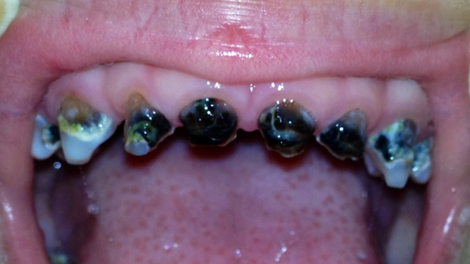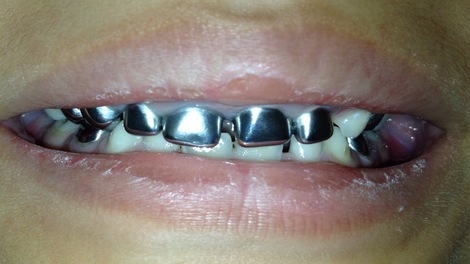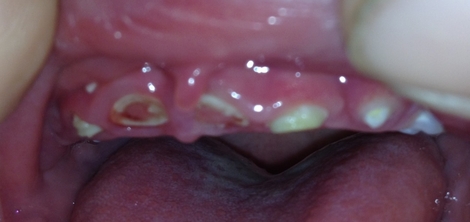Picture of a 5 year old before and after treatment.
As a dentist, if I were to tell you that there was one thing you could do to save your toddler or baby from excruciating pain, chances are you would sit up and listen. And yet, this simple advice flies below the radar for so many parents.
Nursing Bottle Syndrome (NBS), also known as Baby Bottle Syndrome, affects children less than five years of age. NBS is caused when baby teeth have contact with liquids containing sugar such as milk, formula or juice for an extended period of time. It causes extensive decay. Consequently, children as young as two years end up needing fillings, crowns or extractions.
For the last thirteen years, I have seen a dramatic spike in toddlers coming in for these procedures and as a professional dentist, it is unbearably painful. And to think that swapping water for either milk, formula or juice in baby bottles is a preemptive solution is so often tossed to the side.
Have We as Doctors Failed?
Each patient with NBS costs Medicare up to $2000, if not more. Most of my NBS patients are children who are less than five years old. I have seen them suffer and their parents cry as they undergo treatment. Imagine the result if we channeled this money to educate parents and children about this under-addressed issue. With teenage motherhood on the rise, educating parents should be a priority for our media and government. I became a mother at the age of 35 and it was not easy; surely teenage mothers must find parenting even more challenging than I did.
Picture of a 17 month old baby who went through full mouth restoration, four extractions and multiple baby root canals and crowns.
The Solution is at Hand
When children fall asleep while having the bottle or while breast feeding, the milk remains in their mouth all night long. Bacteria present in the mouth breaks sugar down into acid, causing tooth decay.
Does this mean we should not breastfeed? Breastfeeding is great for a child but after their first birthday, have a bottle of water ready to swap after feeding, so any residual milk or formula is rinsed down. Aim to gradually reduce the frequency with which you feed at night.
Harried parents also use a bottle filled with milk or juice as a pacifier. Others dilute juice with water in a sippy cup. Still others ply their children with sugary snacks. As a result, there is a steady stream of sugar in contact with the teeth, giving bacteria lot of time to cause cavities.
Tips to Prevent NBS
Wean children from the bottle as early as 12-14 months.
Never let your child walk around with a bottle filled with milk for more than 20 minutes.
Begin brushing your child's teeth as soon as teeth appear, or clean them using a wet cloth.
Dental examinations should begin at 12 months or earlier, if a problem is noted.
Juices and sodas cause erosion of teeth and should be avoided. 4oz is the maximum amount of juice a child should consume in a day.
Children should be fed every 2-3 hours. A typical schedule could be breakfast at 8:00 am, snack at 10:00 am, lunch at 12:00 pm and so forth. Water is the only thing they should be consuming between the meals.
Healthy teeth start young and a few simple steps can avert very painful consequences. In life, it is never too early to start a healthy habit.


